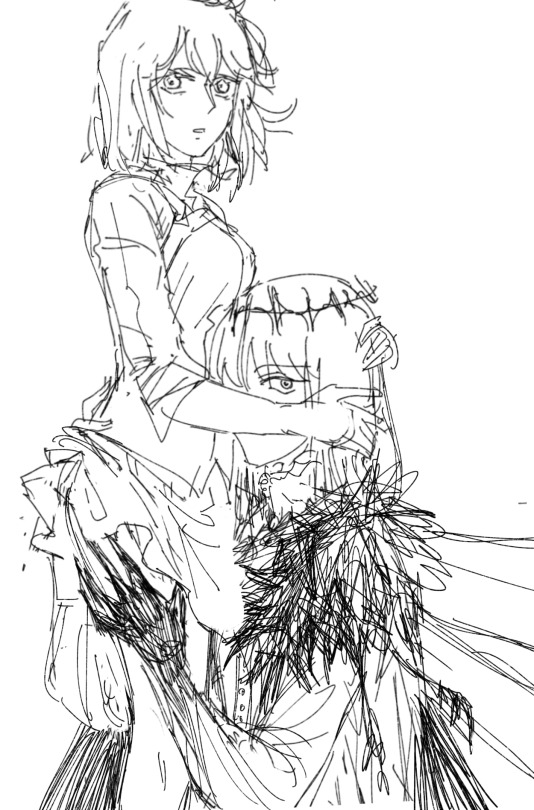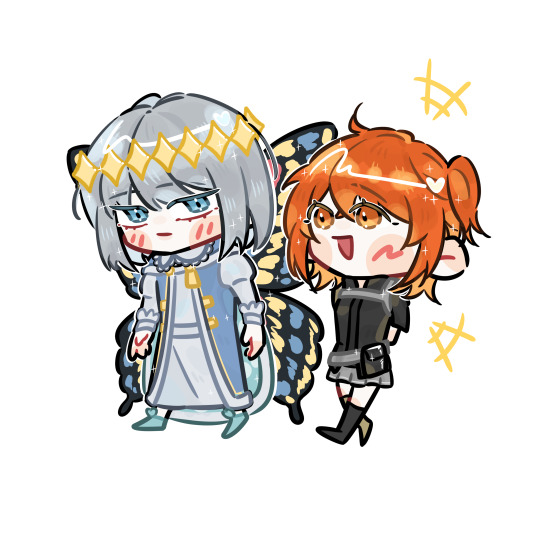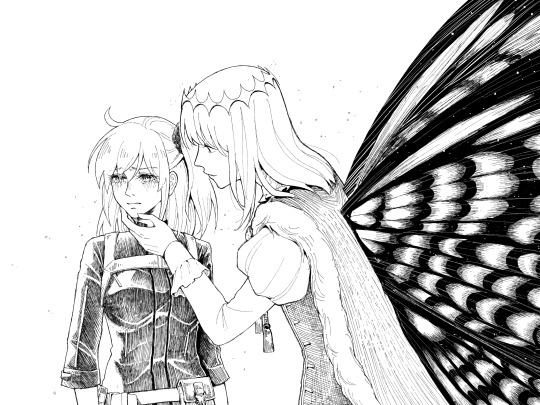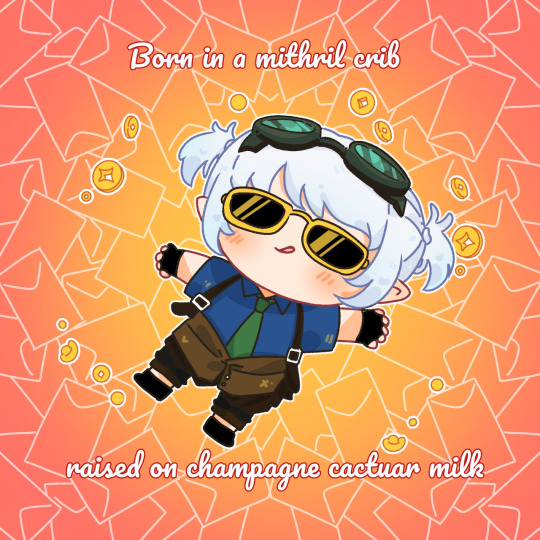I go by Sythe on fanfiction.net and AO3. My birthday is June 1st 1988 I'm a Vietnamese journalist and published author. I started out writing English fanfiction when I was a teenager as a way of exercising my English. These days I write for fun and stress relief when I have the time. I'm currently in the MDZS fandom (the Chinese side) and learning Mandarin Chinese (HSK4) because of it.
Last active 60 minutes ago
Don't wanna be here? Send us removal request.
Note
Hi there @asksythe! New FGO (NA) player here, been playing for 3 months since April, and I just wanna say... Lies and His Wife Truth is AMAZING! I love the dynamic between sussy Oberon and Ritsuka and the feels they're making me experience. I LOVE just how DEMONIC Oberon can be without Ritsuka's interference, like Aurora had it coming but GOD DAMN dude I bet he made the Red Wedding look silly (A Melusine POV for this plot point, perhaps?). So many questions, the mystery surrounding these two is killing me!
Can't wait for you to update, I want to see the flashbacks (the SEGGS) and the Divorce Arc (it's gonna shatter me, for sure).
QUESTION:
Not related to your works but about LB7, You see I haven't started out that yet in fear of ORT, like I only have 101 (as of the moment) servants in my disposal and half of them aren't fully ascended yet (its those stupid fangs, shields, chains and bones). I'm planning to ascended them all of course, but its the skills and number of servants I'm worried about (most of them still sitting 1/1/1 💀)
Just wanna ask how many servants you have when playing LB7, how many you sacrificed (Spider and UFO phase), and are they're skills 10/10/10?
I want to finish the story til OC1 by the end of July or early August, because college is a bitch and I fear I won't be able to play due to studying.
Anyways, I love your work and hope you update soon🥰!
Oh hey! Glad you enjoyed it. I had about... hmmm, 200 servants when I did the Ort marathon fights. They were all fully leveled. All of my 5 stars are 10/10/10 skilled, and all of them have at least 1k fou to both their atk and def. They all have their second append skill unlocked too. My 4 stars... I haven't full skilled all of them, but I have leveled up all the NP battery skills to level 10. Same for my 3 star and down servants. Anything having to do with NP battery, leveled. The rest is more still in progress, depending on what kind of resources I have at the moment and how much I want to save for future rolls. I would say... assuming you have completed LB6, passing Ort with 101 servants is... difficult, but I think still doable. I would recommend you invest in a good starting NP CE. A Kaleidoscope, if you have one. If you don't, the 4-star CE Imaginary Number Magecraft is also a good option. These CEs allow your servants, even low rarity, low-skilled ones, to fire off their NP at Ort at least once. My Ort run, I used my low rarity servants first and at the end, I had only worked up to my welfare 4-stars, with the rest of my 4 stars and 5 stars having never had to enter battle at all. P.S: Melusine doesn't get to see the fallout of the Wind Clan and Aurora in Lies. By that time, she was already sitting in Morgan's dungeon following the Summer Solstice incident. It was her good behavior that saved Aurora's life once Oberon was done with all the Wind fairies... or at least that's the official story from Morgan's court. But yes, Melusine does get a front seat view to what monster Aurora poked in the eyeball.
3 notes
·
View notes
Text

Wip com. Oberiri
21 notes
·
View notes
Text

Oberiri, as usual. Commed. Artist: Nori I'm pretty happy with this. So cute. I like Nori's art style a lot. There are actually three other background colors.



But I think the salmon pink ties together Riri's hair and outfit the best.
9 notes
·
View notes
Note
Could you help me understand something? Vortigern of PHH, I’ve seen conflicting statements on what he is. Is he a terminal meant to destroy Britain rather than let it's Mystery fade into the Age of Man, or meant to keep it from fading from the Age of Gods entirely?
You mean is Vortigern a terminal device in the same manner as Oberon Vortigern? I personally don't think so... because Vortigern was very explicit in his wish to make the British Isle into a paradise for the mystics. He was anti-human... but nowhere did he say he wanted to end it all ala Oberon in LB6. The rest is... uh... kinda debatable... in the usual convoluted Nasu writing and unreliable narrator / point of view character. So the literature you will want to check for this part is a light novel titled 'Garden of Avalon.' It's not especially long, and as far as I know there are several translations available online. Vortigern, by his own words and by the words of other point of view characters, was both a fae changeling and, once he ingested the blood of the white dragon, the manifestation and will of the British Isle. Considering the fact that he reverted back into an old, frail man after he was felled in battle by Rhongomyniad, I really question his true birth nature though. If he really was a fae changeling as so many characters claimed, wouldn't he... you know... revert back into a fae upon defeat? The fact that his defeated form before death was human speaks more of someone who loathed his own human nature and who kept resorting to extreme methods to trans-race himself into something not human.... 😅 instead. As to what he was aiming for, here is his line to Artoria when the two battled:
"Why do you resist? Why do you not accept it? Why do you cling to humanity? Britain must fall. You must perish. If this island is to be defiled by human hands one day, then I will bring it back to its original form. I must turn Great Britain into hell. A paradise of darkness forever uninhabitable by man." But the question is, can we take that at face value? When you think about it, there are a lot of contradictions big and small in Vortigern's actions and words... There are a lot of contradictions in the words of other characters too really. So really the best way is just for people to read the light novel and develop their own individual interpretation.
7 notes
·
View notes
Note
I just wanted to thank you for writing Lies. You single-handedly ignited my interest in Obeguda. It’s a truly beautiful story that gets both the larger than life, living by dreams and ideals feel of Nasuverse and the fantastical atmosphere of the fairy realms. I’ll probably be getting back into similar themed stories like the Ancient Magus' Bride as a result. Just, thank you.
Aww, thanks. I'm glad you enjoyed it. I'm in the process of writing the next chapter, after over 8 months of not being able to touch it due to work reasons. I'm a bit rusty, so it's taking some time to reacquaint myself.
6 notes
·
View notes
Text

Oberiri Commed. Gian Do
44 notes
·
View notes
Text

Commed. Oc Que. A certain version of Ritsuka in her little moon garden. I'm just cooking some wacky Asian fairy tale about a magical (monkey) girl in her magical prisma moonland and a hell bug watching her from afar while hatching some nefarious schemes to steal away the monkey-tailed moon maiden. Hahahaha...
It sounded better in my head, I swear.
17 notes
·
View notes
Text

It's done! Click please for the full-sized pic!
Commed. The artist who completed this piece for me is Nga Phuong! It's an illustration for a specific scene in an Oberiri story idea I'm playing with. The scene is Riri having a lapse where her emotions overwhelm her. This is during Lostbelt 6, shortly after Oberon joined the group but very much before Riri met Mash again in Norwich. So nobody really knew what might have happened to Mash. She could very well have been lost to them forever. The dangers in each Lostbelt is very real, for all that our spunky girls eventually overcome them all. Even Riri, who usually projects a face of strength and calmness for her servants and compatriots, has her moments of weakness. At the end of the day, she's a young woman thrown into a very unfair situation. In this scene here, Riri is... almost on the verge of crying. Not quite but getting there. And it's during one of the many 'alone together at night' moments between Oberon and Riri during Lostelt 6. Oberon is... fascinated. This is purely my own headcanon, but I believe the LB6 fairies to be incapable of crying (or of genuine joy, barring a handful of exceptions that proved the rule... looking at you Barghest). On the whole, they are already very mentally and emotionally malformed when compared to regular PHH fairies, not having things like fairy eyes (when Oberon being only technically half a fairy still has fairy eyes) and such. So Oberon, despite having existed for thousands of years under different iterations in LB6, has never seen this thing called tears. He's fascinated. He's already fascinated with this creature called the Last Master of Humanity, coming from this abominable place called Pan Human History. Well, this story idea I have isn't new. The premise is that those 'nightly talks' between Oberon and Riri become a full-blown torrid affair between the two of them, with neither side having intended on it happening. But what do you know? Something as irrational as emotions can hardly be planned or controlled. And then plot happens and lots of complications for two people on opposing side who are secretly sharing warmth in the night. In this instance, Riri cottons onto there being something fishy about Oberon much earlier on (but doesn't call him out on it)... and Oberon's canonical fascination with Riri becomes a full-blown obsession (that he won't admit). Haaa... what are we to do, huh, King of Fairies? Your mouth keeps calling Titania's name while your hands embrace some other woman at night. Does this count as infidelity? Hahahahaha
#ask sythe#gudako#fanart#ritsuka fujimaru#fate grand order#fgo#obeguda#obegudako#oberon#oberon vortigern
70 notes
·
View notes
Text


Taylor chef!
41 notes
·
View notes
Text

Sythe has good news!
Who made you cry, baby girl? I'll punch him in the nuts for you! Also, lovely people who have been with my sleepy little blog for a decade (and counting). I just want to make an announcement. After eight months, 3 bouts of sickness, one almost broken little toe, and more nights being woken up at 3 in the morning by my billionaire client than I care to count... I have... finished... the job for them. 2 books, 400 pages and 100 thousand words each, in 8 months. I have completed the job. I am now... FREE!!! I AM FREE!!!! I HAVE TIME TO SLEEP NOW! I HAVE TIME TO DO MY LAUNDRY! AND GO TO THE SWIMMING POOL! AND SPEND TIME WITH MY FAMILY! AND PLAY WITH MY CATS! AND COOK PROPER MEALS EVERY DAY!
I AM FREE!
I CAN WRITE FANFICS AGAIN! YAAAAAHHHHHHH!!!!!!
14 notes
·
View notes
Text

Wip. Oberiri
30 notes
·
View notes
Text

Something something rich dwarfette showing her drips. It's my brain at 3AM. Don't judge me.
2 notes
·
View notes
Text

Polaris Taylor Hebert - Illustration for Ancient Quest - A Beach Episode that never happened (or happened in my dream only). Curse the tyrannical dice god!
8 notes
·
View notes
Text


The Great Serpent of Ronka. Illustration for Ancient Quest.
5 notes
·
View notes
Text



The divine phoenix of hope, ladies and gentlemen! Esper!
2 notes
·
View notes
Text

WIP... Who planned this bird's color scheme in the original game??!!! It's shockingly garish!
0 notes

